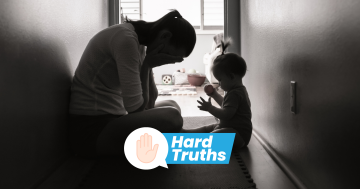
Experts recommend approaching family violence or abuse carefully and sensitively. Photo: Michelle Kroll.
Ever had that gut feeling that your friend is in an abusive relationship or is experiencing domestic or family violence? Are you torn about what, if anything, you should do about it?
Family or domestic violence is an issue that can affect anybody. It does not discriminate. Family violence includes financial control, physical abuse, sexual violence or abuse, threatening behaviour and coercive control.
Victims of domestic or family violence often hide what is happening to them from other loved ones. Feelings of shame, humiliation, fear and worthlessness they are experiencing, and the patterns of family violence itself can work against victims disclosing what is happening to them or even recognising it.
A victim may not be comfortable opening up. They might downplay what’s happening or pretend everything is fine.
It can be difficult to know what to do, especially when you’re angry or scared for the victim and want to help. Here are some tips:
- Approach the topic carefully and sensitively when their partner is not around.
Be calm and kind. Listen without judgement and try to avoid immediately suggesting solutions. Simply ‘holding space’ for them to process what is happening can make a difference. Offer reassurance that you believe them and validate their feelings. - Avoid asking the question outright.
Sometimes a simple “are you ok?” can be powerful. Let them know – and reinforce – that you are a safe place where they can share without judgment or blame. Explain your concerns but don’t force them to talk if they are not ready yet. - Avoid making negative comments and name-calling. Do not blame the victim.
Don’t be surprised if they become defensive or deny your concerns. Understand that they may need to share gradually rather than divulge everything at once. Encourage them to engage with support services and a counsellor who have the skills and training to support them alongside your love and care. - Don’t tell them what to do or pressure them to leave the relationship.
They may not be ready to leave the relationship after confiding in you, or once they do leave, they may return to the relationship. Statistically, it can take a victim of family violence eight attempts to leave the relationship before separation is permanent.

The Parker Coles Curtis team. Photo: Parker Coles Curtis.
- Don’t take it personally if they withdraw from you at times.
Remember that they are not trying to push you away if they become distant or cancel plans at the last minute. They may be operating in a cycling state of ‘fight’ or ‘flight’. Continue to let them know that you are there for them to listen and support. - Offer to assist them in practical ways.
This could include being an emergency contact for them; holding a bag of emergency supplies containing money, clothes and important documents for them; developing a ‘safe’ word that they can say to you to indicate they need immediate help; and accompanying them to meetings with support services or legal processes to provide moral support. - Look after yourself too.
It can be stressful, worrying and overwhelming to support someone experiencing family violence. Connect with support services for yourself and engage in healthy self-care practices regularly.
There are a number of support networks available for people who are victims of family violence. These include the Domestic Violence Crisis Service (DVCS) which has a 24-hour emergency hotline and can assist with creating an exit plan.
The Women’s Legal Centre helps improve women’s lives through specialist legal representation, support and advocacy, including experiencing or emerging from a violent or controlling relationship.
The pandemic-enforced lockdowns have created a huge increase in domestic cases in Canberra and across the country. In the lead up to International Women’s Day on 8 March, Parker Coles Curtis hopes you will put your hand up to support Canberra Giving Day on 9 March and the women in need who may be escaping family violence by donating to this worthy cause.





















